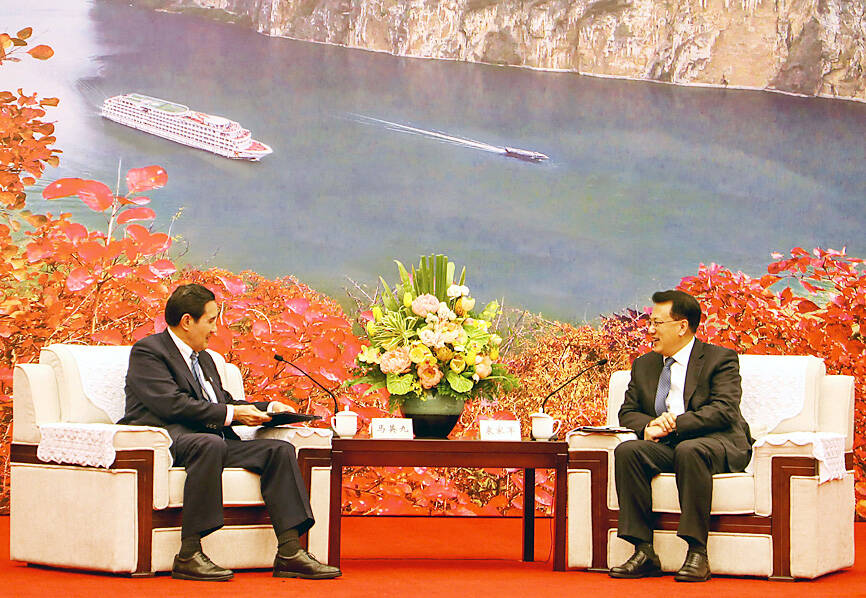Former president Ma Ying-jeou’s (馬英九) office distorted the truth when it said that the Mainland Affairs Council (MAC) sought to deny the Republic of China’s (ROC) existence and had advocated a “two-state theory” in its criticism of Ma, the council said yesterday.
On the seventh day of his trip to China on Sunday, Ma gave a speech to 28 Taiwanese students and 32 Chinese students at Hunan University in Changsha.
“Our country” amended the constitution, so that “our country was divided into two parts — one is the Taiwan Area, and the other is the Mainland Area — both are [parts of] our Republic of China, both are [parts of] China,” Ma said in the speech.

Photo: AFP / Ma Ying-jeou’s office
Ma went on to discuss how Taiwan and China are defined in the Act Governing Relations Between the People of the Taiwan Area and the Mainland Area (臺灣地區與大陸地區人民關係條例), introduced in Taiwan in September 1992.
Article 2 of the law states that “the Taiwan Area” refers to Taiwan proper, and the island groups of Penghu, Kinmen and Matsu, while “the Mainland Area” refers to “our territory” excluding the aforementioned islands, Ma said.
He said he was aware that “the preamble of the 1982 Constitution on the mainland also mentions ‘Taiwan is part of the sacred territory of the People’s Republic of China [PRC],’” and “this is a clear fact.”
The council on Sunday evening said that Ma had harmed the nation’s sovereignty and dignity by echoing the “one China” principle advocated by the Chinese Communist Party (CCP), adding that “the ROC and the PRC are not subordinate to each other.”
Ma’s office yesterday questioned whether the council had contravened the Constitution by suggesting that “the mainland is another country” in openly advocating the “two-state theory.”
The council said that “the ROC and the PRC do not belong to one another,” adding that this has been a fact for a long time, is the objective “status quo” of the Taiwan Strait and is in line with the ROC Constitution.
The ROC is a sovereign state and Taiwan has never been part of the PRC, the council said.
It said that Ma was echoing the CCP’s “one China” principle.
“The PRC’s constitution absurdly states that Taiwan is part of the sacred territory of the PRC — a claim that a recent poll has shown that more than 80 percent of people in Taiwan oppose,” the council said.
Ma used a claim in the PRC’s constitution to explain that both sides of the Taiwan Strait adhere to the “one China” principle, which runs contrary to Taiwanese public opinion, it said.
China’s “one China” principle not only belittles Taiwan, but also plays to the CCP’s intention to annex Taiwan, the council said, adding that Ma should not echo China’s call and fall into the “united front” trap.

The Coast Guard Administration (CGA) yesterday said it had deployed patrol vessels to expel a China Coast Guard ship and a Chinese fishing boat near Pratas Island (Dongsha Island, 東沙群島) in the South China Sea. The China Coast Guard vessel was 28 nautical miles (52km) northeast of Pratas at 6:15am on Thursday, approaching the island’s restricted waters, which extend 24 nautical miles from its shoreline, the CGA’s Dongsha-Nansha Branch said in a statement. The Tainan, a 2,000-tonne cutter, was deployed by the CGA to shadow the Chinese ship, which left the area at 2:39pm on Friday, the statement said. At 6:31pm on Friday,

The Chinese People’s Liberation Army Navy’s (PLAN) third aircraft carrier, the Fujian, would pose a steep challenge to Taiwan’s ability to defend itself against a full-scale invasion, a defense expert said yesterday. Institute of National Defense and Security Research analyst Chieh Chung (揭仲) made the comment hours after the PLAN confirmed the carrier recently passed through the Taiwan Strait to conduct “scientific research tests and training missions” in the South China Sea. China has two carriers in operation — the Liaoning and the Shandong — with the Fujian undergoing sea trials. Although the PLAN needs time to train the Fujian’s air wing and

The American Institute in Taiwan (AIT) put Taiwan in danger, Ma Ying-jeou Foundation director Hsiao Hsu-tsen (蕭旭岑) said yesterday, hours after the de facto US embassy said that Beijing had misinterpreted World War II-era documents to isolate Taiwan. The AIT’s comments harmed the Republic of China’s (ROC) national interests and contradicted a part of the “six assurances” stipulating that the US would not change its official position on Taiwan’s sovereignty, Hsiao said. The “six assurances,” which were given by then-US president Ronald Reagan to Taiwan in 1982, say that Washington would not set a date for ending arm sales to Taiwan, consult

A Taiwanese academic yesterday said that Chinese Ambassador to Denmark Wang Xuefeng (王雪峰) disrespected Denmark and Japan when he earlier this year allegedly asked Japan’s embassy to make Taiwan’s representatives leave an event in Copenhagen. The Danish-language Berlingske on Sunday reported the incident in an article with the headline “The emperor’s birthday ended in drama in Copenhagen: More conflict may be on the way between Denmark and China.” It said that on Feb. 26, the Japanese embassy in Denmark held an event for Japanese Emperor Naruhito’s birthday, with about 200 guests in attendance, including representatives from Taiwan. After addressing the Japanese hosts, Wang